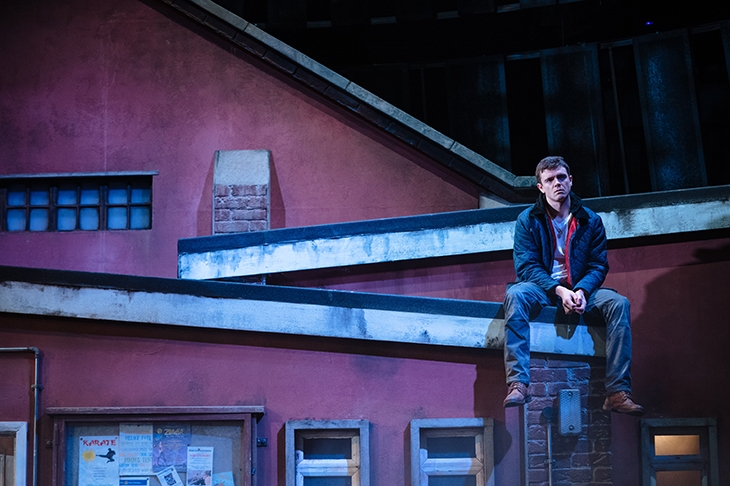Blood Wedding, by the Spanish dramatist Federico Garcia Lorca, is one of those heavyweight tragedies that risks looking a bit ridiculous when you take it out of its period setting. With rival families, murdered patriarchs and Albanian-style blood feuds — not to mention a talking moon — modern adaptations often come across as implausibly melodramatic.
Hats off, then, to Barney Norris for his decision to strip back much of the excess drama for his West Country rewrite of Blood Wedding. Norris stays loyal to the play’s central arc — a frenzied bride torn between her husband-to-be and her bad-boy ex-boyfriend — but decides to dispense with much of the baggage (not to mention half of the characters). It’s a bold move, but one that pays dividends. What’s left is still recognisably Blood Wedding, but only in the same way that Clueless is still Jane Austen. And like Clueless, it can stand just as well on its own two feet.
This regional production is an example of how theatre, as a cultural service, is meant to work
Norris recasts the main characters as small-town British archetypes. Lee, based on Lorca’s hot-tempered Leonardo, is an undereducated local hardman. Rob is a slightly clueless video-game geek who vents his social frustrations on his long-suffering mum. And Georgie, who dumps Lee on the instruction of her anti-traveller father, is one of those working-class beauties destined to be worn down by a world that will never fully appreciate her.
Leaving Lorca aside, it’s clear that Norris himself is a mightily talented dramatist. Every moment of the play — even the rehashed moon scene — is both believable and engaging. One of his clever turns is to leave the wedding itself off-stage, and to set the pivotal scenes in the outdoor smoking area. It works because it’s so recognisable. Who hasn’t found themselves having a heart-to-heart in a pub car park, as the deadened but recognisable tones of Pulp’s ‘Common People’ throb through the walls? Norris, I suspect, has eavesdropped on a good few such conversations in his time. Even better, he has that rare attribute that all good writers need: he doesn’t take his work too seriously. Alongside the emotional stuff, he peppers Blood Wedding with crowd-pleasing jokes about north Wiltshire. One gag in particular is pure end-of-the-pier. The audience lapped it up.
Whether intentional or not, Norris has tapped into one of the big differences between regional audiences and London ones. Most punters at the Salisbury Playhouse aren’t drama aficionados who are swayed by accolades and broadsheet reviews. Many will be friends of the theatre who book ahead for the whole season in one go, willing to risk £15 on shows they’ve never heard of. Norris makes sure there’s something for all of them.
In that way, Blood Wedding isn’t just a good play, it’s also an example of how theatre — as a cultural service — is meant to work. After the Brexit vote, much of theatre’s London-based high command waxed lyrical about the need to bring a divided nation back together. But it’s Wiltshire Creative, which commissioned this production, that has shown how actually to do it. Here’s the plan: the National Theatre should offer cash to bright local writers to reimagine big-ticket dramas for their area. If the locals like it, as they did here, commission the writer again. Add a bonus prize for the best local joke. It’s a recipe that should work anywhere.
It’s a different story at Theatre Royal Bath, which hosts the UK première of Will Eno’s The Realistic Joneses, a strange little number that made a splash on Broadway a few years ago. The two sets of Joneses referenced in the title are two couples — Bob and Jennifer, and John and Pony — who end up as neighbours in a small mountain town. We learn early on that Bob suffers from an incurable (fictional) condition called Harriman Leavey Syndrome, which causes his thoughts to spurt out in non-sequiturs. The manifestation is somewhere between Tourette’s Syndrome and one of those irritating random comedians you get on television panel shows.
The play starts promisingly. Eno uses Bob’s condition to have fun with language. He takes conversational niceties — those meaningless phrases we use to make small talk at dinner parties — and turns them into little bursts of linguistic weaponry or poetic sadness. The problem is that once he’s reeled us in he doesn’t know where to take us. There are occasional hints of a plot — we learn that John happens to be in the early stages of Harriman Leavey himself — but they soon get buried under more self-satisfied word games. By the interval the mirth has subsided noticeably. Lines that would have required a laughter pause at the beginning are met with few chuckles.
There are occasional nuggets of gold, but they feel incidental to the play. The evening is saved by the impeccable standard of acting from all four cast members. Jack Laskey brings a rakish malice to the role of John, while Clare Foster shines as the jaunty Pony. You get the sense that having an Eno play on your CV is the sort of thing that scores points in the acting world. At least these four do it justice.






Comments